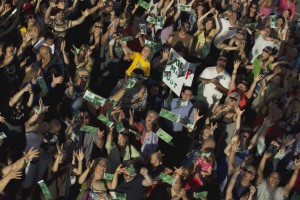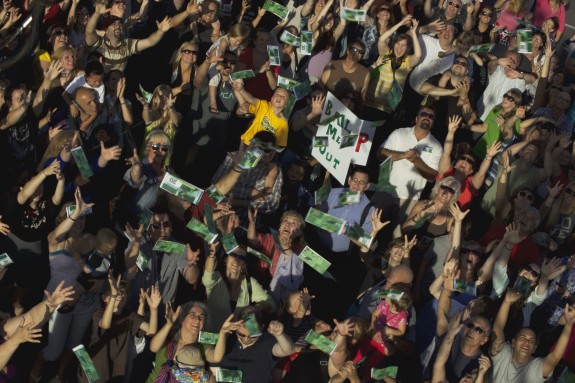MONEY TALKS PART I: A chat with Bruce Sellery of OWN’s ‘Million Dollar Neighborhood’

With the economic recession continuing to have nasty repercussions for families across the United States and Canada, reality television programming has set out to document the difficult struggles and inspiring stories of triumph. In the face of sustained economic woes, the cameras have been turned on to bear witness to this unique time in history.
Million Dollar Neighborhood, the new show on OWN: Oprah Winfrey Network, continues that trend and promises to find the balance between entertaining audiences and educating them on their financial options. In Aldergrove, Canada, a small community near Vancouver, families have an up-hill climb to evade bankruptcy and keep their homes. The local residents have many strengths and opportunities, but their willpower needs a shot of adrenaline. Enter Million Dollar Neighborhood and its co-host, Bruce Sellery, financial expert and author of Moolala: Why Smart People Do Dumb Things with Their Money — And What You Can Do About It.
Over the course of 10 weeks, the Aldergrove community comes together for a series of challenges to help them regain their financial foundation. Their task is difficult: They need to save an average of $100,000 per week, resulting in $1 million at the end of the series. Sellery is with them every step of the way, leading them with new ideas and reminders of their potential.
Recently, Hollywood Soapbox talked with Sellery about the show and what audience members can do to save some money in these difficult times. Here’s Part I of that conversation (click here for Part II). Questions and answers have been slightly edited.
The premiere episode of Million Dollar Neighborhood was entertaining and even educational. It seems like you’re having a ball with the show.
I had a ball, and am having a ball. It truly feels like the job I was meant to do, because I have this really weird background of journalism, public speaking training, coaching, personal finance — all these crazy skills. And this was the gig that brought them all together in this weird and wonderful way.
It was fun. I’m glad you were both entertained and you took some things away, because what I love is that people first say, ‘It’s really entertaining. It was really fun to watch.’ And then they’ll sort of say under their breath, ‘And I actually went home and calculated my net worth.’ Almost like that’s horrifying and they shouldn’t admit to it. But they did. There’s stuff throughout the entire series where you sort of osmotically pick it up and go, ‘Oh, OK.’ But it’s not the focus of it. It’s not like you’re sticking the average American in front of CNBC and saying, ‘Watch this!’
How did you get attached to the project?
I wrote a book called Moolala: Why Smart People Do Dumb Things With Their Money — And What You Can Do About It. So I wrote this book, and the objective was to have some fun with money — not in a stand-up comedy way, but in an engaging, sort of relevant way that I would bring to these workshops that I offered. I was on the book tour in Vancouver, and the development executive saw me on the morning news. He said, ‘We need to talk to that guy.’
I am one of the very, very few personal finance folks that talks a lot about and is very passionate about community. So my book, and in fact my whole methodology, is based on four principles, and one of them is community. So in the book, I talk a lot about how do you discuss money and make it relevant and real and not offend your friends and family? Because I so believe that community makes all the difference when it comes to getting a handle on your money.
We know that if you want run a marathon, be a part of a community. If you want to raise a child, talk to your friends and family, they’ll help you. All these areas of life that are so important to people, we naturally resource community around us to provide support, ideas and accountability. That’s what communities do. It’s just natural. And yet we don’t do that with money, which is such a missed opportunity. In the book I talk about how you do that and ways to do that, and that’s exactly what Million Dollar Neighborhood was all about.
Because you’re looking at a Canadian community, it gives a little more of a perspective for American audiences that these troubles are shared by people all around.
They really are. They are ubiquitous across culture, across ethnicity, across language, because they are sort of founded in part in the consumerism of our culture today and in part the obliviousness that we have in an increasingly complex world when it comes to money. A lot of stuff has happened that has made it tougher.
My parents, they have pensions. It’s not a big deal. That’s the way it worked, and a lot of people’s parents have pensions. So they don’t really have to worry about their retirement in a way … that our generation is absolutely going to have to worry about a pension. We’re not a part of public service unions to that extent. We’re just not taken care of in that way. And yet we’re sort of behaving more or less the same way as our parents. We’re worse in saving and we spend more. The job market is way less certain.
In Million Dollar Neighborhood, you get an idea of that overspending from these personal stories. Were you surprised by anything you found on the show?
I was surprised to the extent of denial. … They said, ‘I want to be on a reality TV show about money.’ So compared to the population at large, there was way less denial than the population at large. But still an incredible amount of denial. They could kind of sort of inch their way along, and keep their head above water. When you look at the financials, you think, I can tell you exactly how this is going to end. If you don’t do anything, here’s how it’s going to end. You’re going to lose your home and go into bankruptcy. And they have their ears covered and their eyes shut and they were humming softly the theme from Shaft and just pretending that it wasn’t happening, which I understand.
I demonstrate that behavior when it comes to my car. I have a longstanding history of not reacting to very clear signals that my car needs repair. I live in this world where it will repair itself. It makes no sense, but that’s what I do. … I don’t replace the air conditioning so you can fry an egg on the dashboard in the summer. Because I sort of think it will all take care of itself, and it doesn’t. It’s the same with your money. It doesn’t just take care of itself.
Did this show eat up your life for the 10 weeks of the challenge?
I was part-time in the community. So I would fly in and fly out. I don’t live near the community. When I wasn’t in the community, I was working with producers on the challenges and those kinds of things. I also spent a lot of time in off-camera sessions with the families. There’s part of it that is on television, that’s on the air, and you’ll see me focus on a few of the families, but not 100 of them. So I would literally sit in the local coffee shop for days, taking one-on-one meetings with people.
And I did that partly because that’s my commitment. I want to make a difference for people. But partly too, you want these people to stay engaged in the challenge, and if they’re not feeling like they’re moving forward, it becomes very difficult to have them willing to show up week after week after week and do all these crazy things … and that was a struggle. It’s really hard. How do you help 100 families?
By John Soltes / Publisher / John@HollywoodSoapbox.com
-
Million Dollar Neighborhood airs Saturdays at 9 p.m. on OWN: Oprah Winfrey Network. Click here for more information.

